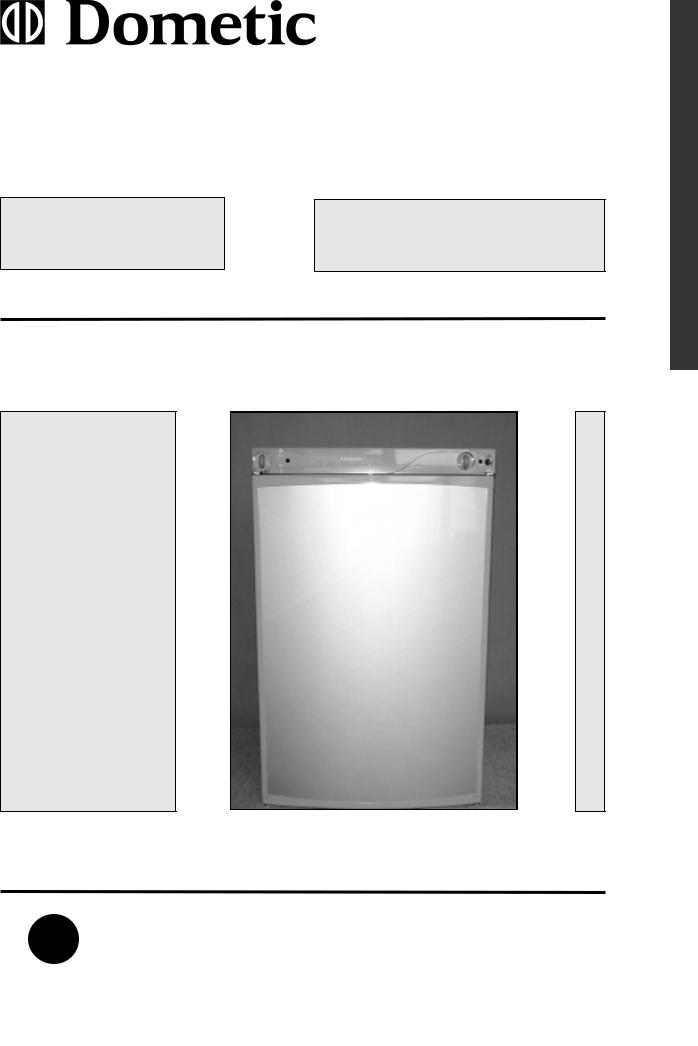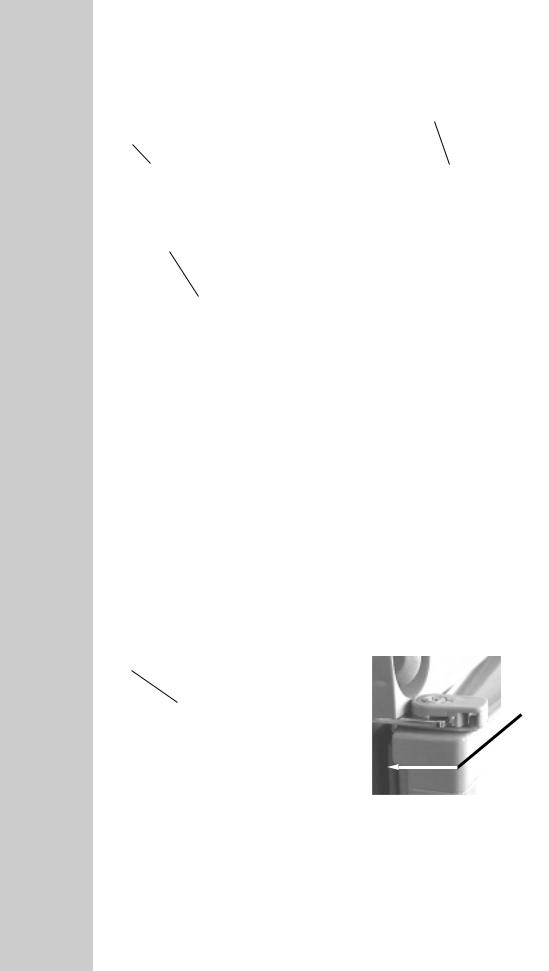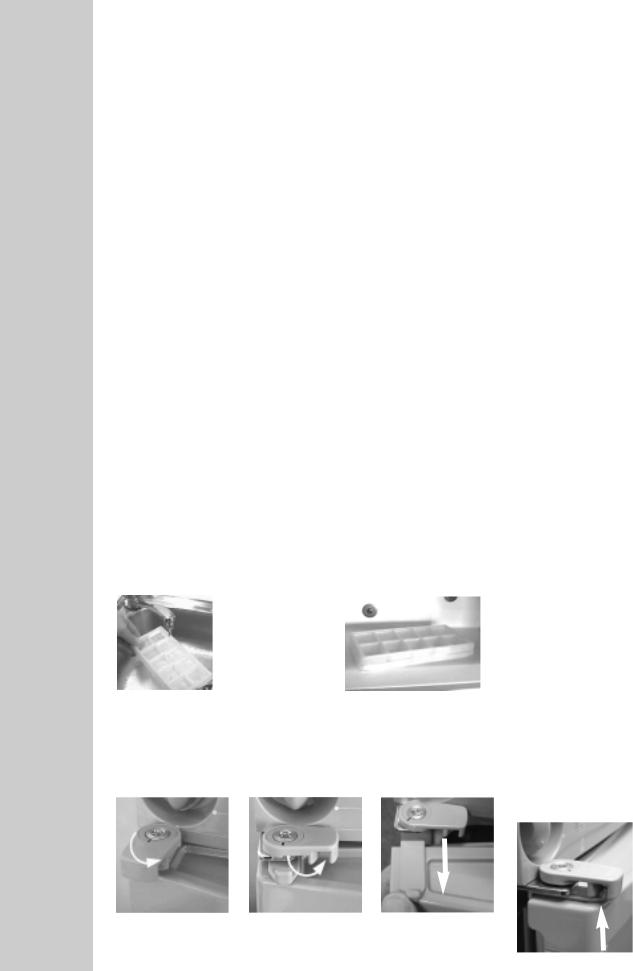AEG-Electrolux RM6391L User Manual

MANUAL
RM 6390 (L)
RM 6391 (L)
ABSORPTION REFRIGERATOR for RECREATIONAL VEHICLES
EN
English
Typ C40 / 110 |
T.B. 03/2003 |
These operating instructions should be kept in a safe place.
If this device is passed on, please include these operating instructions with it.
© Dometic GmbH - 2003 - Subject to change without notice - Printed in Germany
2

TABLE OF CONTENTS
1.0 |
INTRODUCTION |
4 |
|
2.0 |
FOR YOUR SAFETY |
4 |
|
|
2.1 |
Warning and safety notices |
4 |
|
2.2 |
Coolant |
4 |
3.0 |
WARRANTY AND CUSTOMER |
5 |
|
|
SERVICE |
|
|
|
3.1 |
Damage in transit |
5 |
4.0 |
DESCRIPTION OF MODEL |
5 |
|
5.0 |
REFRIGERATOR GUIDE |
5 |
|
|
5.1 |
Cleaning |
5 |
|
5.2 |
Switching on the refrigerator |
6 |
|
5.3 |
Switching off the refrigerator |
8 |
|
5.4 |
Defrosting |
9 |
|
5.5 |
Storing food |
9 |
|
5.6 |
Making ice cubes |
9 |
|
5.7 |
Door locking |
9 |
|
5.8 |
Winter operation |
10 |
|
5.9 |
Interior light |
10 |
|
5.10 Changing the decor panel |
11 |
|
|
5.11 Positioning the storage racks |
11 |
|
|
5.12 Changing the doorhang |
12 |
|
|
5.13 Troubleshooting |
13 |
|
|
5.14 Maintenance |
13 |
|
|
5.15 Environmental hints |
14 |
|
|
5.16 Disposal |
14 |
|
|
5.17 Energy-saving tips |
14 |
|
|
5.18 Technical data |
15 |
|
|
5.19 Declaration of conformity15 |
|
|
6.0 |
INSTALLATION GUIDE |
16 |
|
|
6.1 |
Installation |
16 |
|
6.2 |
Draught-free installation |
17 |
|
6.3 |
Ventilation and air extraction |
18 |
|
6.4 |
Installation of the ventilation |
19 |
|
|
system |
|
|
6.5 |
Securing the refrigerator |
19 |
|
6.6 |
Installation recess |
20 |
|
6.7 |
Fume extraction |
21 |
|
6.8 |
Gas installation |
22 |
|
6.9 |
Electrical installation |
24 |
|
|
|
|
3

1.0INTRODUCTION
You have made an excellent choice in selecting the Dometic Absorption Refrigerator. We are sure that you will be fully satisfied with your new appliance in all respects.
The appliance, which works silently, meets high quality standards and guarantees the efficient utilisation of resources and energy throughout its entire life cycle, during manufacture, in use and when being disposed of.
Before you start to use the appliance, please read the installation and operating instructions carefully.
The refrigerator is designed for installation in leisure vehicles such as caravans or motorcaravans. The appliance has been certified for this application in accordance with EU Gas Directive 90/396/EEC.
2.0FOR YOUR SAFETY
2.1
 Warning and safety notices
Warning and safety notices
Danger Attention
 Never use a naked flame to check the appliance for leaks.
Never use a naked flame to check the appliance for leaks.
Protect children!
When disposing of the refrigerator, remove all refrigerator doors and leave the storage rack in the refrigerator. This will prevent accidental locking in or suffocation.
If you smell gas:
-close the locking tap of the gas supply and the valve on the cylinder.
-open the windows and leave the room.
-do not switch on anything electrical.
-extinguish naked flames.
Never open the cooling unit; it is under high pressure.
Work on the gas, flue system and electrical components must only be carried out by qualified service personnel.
It is imperative that the operating pressure should correspond to the data given on the model plate of the appliance.
Compare the operating pressure data given on the model plate with the data on the pressure monitor of the liquid gas cylinder.
Liquid gas cylinders may only be changed by qualified personnel.
Gas operation of the appliance is not permitted while travelling on ferries.
Covers ensure electrical safety and must only be removed using a tool.
The appliance must not be exposed to rain.
The refrigerator is not suitable for the proper storage of medications.
2.2Coolant
Ammonia is used as a coolant.
This is a natural compound also used in household cleaning agents (1 litre of Salmiak cleaner contains up to 200g of ammonia - about twice as much as is used in
the refrigerator). Sodium chromate is used for corrosion protection (less than 2% of the coolant).
In the event of leakage (easily identifiable from the unpleasant odour):
switch off the appliance.
air the room thoroughly.
inform the authorised Customer Service department.
4

3.0WARRANTY AND CUSTOMER SERVICE
Warranty arrangements are in accordance with EC Directive 44/1999/CE and the normal conditions applicable for the country concerned. For warranty or other servicing, please contact our Dometic Service department. Any damage due to improper use is not covered by the warranty. The warranty does not cover any modifi cations to the appliance or the use of non-original Dometic parts;
the warranty does not apply if the installation and operating instructions are not adhered to and no liability shall be entertained. Parts can be ordered throughout Europe from our Dometic Service department. Your Service Centre contact numbers numbers are found in the “European Service Network” booklet
When contacting Dometic Service, please state the model and product numbers, together with the MLC Code, if applicable. You will find this information on the data plate inside the refrigerator.
3.1Damage in transit
After removing the packaging, check whether the refrigerator has been damaged during transportation.
Any damage sustained in transit must be reported to the transportation company concerned no later than seven days after delivery of the goods.
4.0DESCRIPTION OF MODEL
e.g. RM 6390 L “L” with interior light
Refrigerator Mobil /
Mobile Absorber Refrigerator Last digit 0 = manual ignition
Last digit 1 = automatic ignition
5.0REFRIGERATOR GUIDE
5.1Cleaning
Before using the refrigerator, it is advisable to clean the appliance both inside and out.
Use a soft cloth and lukewarm water with a mild detergent.
Then rinse the appliance with clean water and dry thoroughly.
Remove dust from the refrigerator unit at yearly intervals using a brush or soft cloth.
 To avoid deterioration of materials:
To avoid deterioration of materials:
Do not use soap or hard, abrasive or soda-based cleaning agents.
Do not allow the door seal to come into contact with oil or grease.
5

5.2Using the refrigerator
The refrigerator is silent in operation.
When the appliance is first put into operation, there may be a mild odour which will disappear after a few hours. Ensure the living area is well ventilated.
The freezer compartment should be cold about one hour after switching on the refrigerator.
The refrigerator will take several hours to reach its operating temperature.
5.2.1Controls
A.Manual Ignition (e.g. RM 6390L)
A B C
A = energy selector switch
B = gas/electric thermostat
C = manual ignition button (“Piezo ignition”)
B. Automatic Ignition ( e.g. RM 6391L)
|
|
|
|
|
|
|
B |
|
D |
A |
||||
|
|
|
|
|
|
|
|
|
|
A = energy selector switch
B = gas/electric thermostat
D = “automatic ignition” indicator
Note:
The refrigerator is equipped to operate off mains power, DC or liquid gas. The desired power option is selected by means of energy selector switch (A). Energy selector switch (A) has four settings: AC mains power, DC (12V),
gas (liquid gas), O (off).
Off
 AC
AC
DC
 Gas
Gas
6

5.2.2Electrical operation
1. 12V DC
 The refrigerator should only be used while the motor is running.
The refrigerator should only be used while the motor is running.
1. Set energy selector switch (A) to.
The refrigerator operates without thermostatic |
A |
|
|
control (continuous operation). |
|
2. Mains power
This option should only be selected where the supply voltage of the connection for power supply corresponds to the value specified on the data plate.
Any difference in values may result in damage the appliance.
A |
|
1. Set energy |
|
||
|
|
selector switch |
|
|
(A) to. |
|
|
|
B
2. Use rotary switch (B) to regulate the temperature in the main refrigerator compartment.
5.2.3Gas operation
The refrigerator should only be operated using liquid gas (propane, butane).
Operation using gas is prohibited in petrol stations.
1.Open the valve of the gas cylinder
2.Open the shut-off valve to the gas supply.
Proceed to the description that applies to YOUR model.
1.Manual ignition
1.Set energy selector switch (A) to gas. 
A
3. Activate Piezo C ignition (C)
several times at intervals 1-2 seconds.
2.Press and hold rotary switch.
 B
B
4.Check the inspection glass to see whether there is a flame (the inspection glass is inside the refrigerator at the bottom left).
7

5.Keep rotary switch (B) depressed for another 10-15 seconds, then release.
6.Check the inspection glass to see whether a flame is burning.
7.Repeat the entire process if the flame has gone out.
8.Use rotary switch (B) to regulate the temperature in the main refrigerator compartment.
2. Automatic ignition |
B |
|
A |
1. Set energy |
|
selector switch (A) to Gas. 
2.Press and hold rotary switch (B).
D
3. The ignition process is activated automatically, accompanied by a ticking sound; the indicator lamp (D) will flash. Upon successful ignition, the sound and the flashing will stop.
4. Keep rotary switch "B" depressed for another 10-15 seconds, then release.
5. If the flame goes out, the ignition system will repeat the ignition process automatically. 6. Adjust the temperature in the main refrigerator compartment using rotary switch "B".
All refrigerators, whether manual or automatic ignition, are equipped with automatic flame protection, which automatically cuts off the supply of gas approximately 30 seconds after the flame goes out.
When using for the first time, and after changing the gas cylinder, the gas pipes may contain air. By means of brief operation of the refrigerator and any other gas appliances (e.g. cookers), air is removed from the gas pipes. The gas will then ignite without delay.
5.3Switching off
A
1.Set energy selector switch (A) to position "0" (OFF). The appliance is now fully switched off.
2.Secure the door open by means of the door stop. The door will be slightly ajar; this is to prevent mould from forming inside the appliance.
 Switching off gas operation
Switching off gas operation
If the refrigerator is to be taken out of service for an extended period of time, the on-board shut-off valve and the cylinder valve must be closed.
8

5.4Defrosting
As time goes by, frost builds up on the fins.
When the layer of frost is about 3mm thick, the refrigerator should be defrosted.
1.Switch off the refrigerator, as described in Section 5.3 - "Switching off".
2.Remove the ice cube tray and food.
3.Leave the refrigerator door open.
4.After defrosting (freezer compartment and fins free of frost), wipe the cabinet dry with a cloth.
5.Use a cloth to mop up the water from the freezer compartment.
6.Switch the refrigerator back on again.
The layer of ice must never be removed forcibly, nor may defrosting be accelerated using a heat source.
Note:
Water thawing in the main compartment of the refrigerator runs into an appropriate container at the back of the refrigerator. From there, the water evaporates.
5.5Storing food
Always store food in sealed containers, aluminium foil or similar.
Never put hot food into the refrigerator; always let it cool first.
Products that could emit volatile, flammable gases must not be stored in the refrigerator.
The two-star freezer compartment is suitable for making ice cubes and for short-term storage of frozen food.
It is not suitable as a means of freezing foods.
5.6Making ice cubes
Ice cubes are best frozen overnight. At night, the refrigerator has less work to do and the unit has more reserves.
1. Fill the ice cube tray with drinking water.
 Only use drinking water!
Only use drinking water!
2.Place the ice cube tray in the freezer compartment.
5.7Door locking
Park-position:
9
